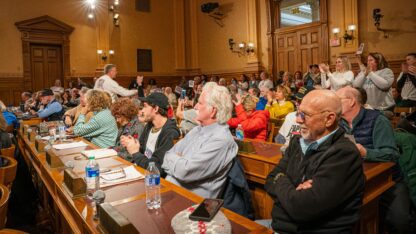While Suicide Prevention Month in September raises national awareness of mental health challenges, for Deamond Robinson, assisting young people who may be experiencing feelings of depression and anxiety is all in a day’s work.
Robinson serves as a certified peer specialist in mental health for the Empowerment Resource Center Inc. (ERC) to help transgender youth and other LGBTQ young people find resources and mental health assistance.
He said many trans youth often end up experiencing discrimination from various social and political spaces, even internally within the LGBTQ community, making it hard for them to find for many to feel safe and protected.
The specialist noted a transgender student who expressed to him the discomfort she felt attending high school.
“She didn’t feel comfortable in any space to use the bathroom,” he said. “She wanted to limit the amount of attention she got… anything that would make them stand out in a crowd.”
He has also seen firsthand the insensitive treatment faced by trans youths from their peers, particularly with trans women.
The effects can lead to a deterioration of mental health, including self harm, depression, as well as suicide ideations and attempts.
According to a 2022 national survey conducted by The Trevor Project, 46% of LGBTQ youth in Georgia seriously considered suicide within that year, including 55% of transgender and nonbinary youth.
Out of the 46% that year, 14% had attempted to take their own life within a 12-month period, with 16% of Georgia transgender and nonbinary youth being apart of the percentage.
Robinson, who identifies as gay, believes that his own personal struggles with mental illness and depression allow him to connect with what some of the trans youths that he counsels.
“Using my story and using my real experience has really been the best avenue,” he notes when asked on how he attempts to make those who come to him feel comfortable.
“I have lived and experienced a lot of those traumatic experiences over my lifetime. I know what I needed in that moment and the questions that I needed to hear… ‘How can I help up? How I can support you? Do you want to talk about it?’ It gives them that space to determine whether they want to talk about it, or if they are suicidal,” he said.
Robinson and ERC also work closely with Lost and Found, an LGBTQ youth shelter that houses residents aged 18 to 24, who are often abandoned by family members due to their identity.
In their partnership, both organizations strive to provide resources such as clothing, skills training and money management.
The specialist notes that one of the most difficult resources to secure involves providing trans youth with proper gender affirming care.
Many of these issues can be attributed to Senate Bill 140, a statewide legislation passed last year which banned gender-affirming surgery for transgender minors and has made it more difficult for minors to access hormone therapy.
“Finding those resources [and] finding organizations that provide that resource has been a barrier, and it’s very sad,” he said. “These individuals are just trying to live their truest expression, and having to jump through hoops and barriers just to get the care that they deserve has been one of the biggest struggles in providing care for trans youth.”
Despite the adversities that Robinson said that his clients experience, he added that it is always rewarding to see the mental and emotional growth of those that he has helped to assist.
“It’s really being able to see people make their own choices, and actively growing and healing, and seeing them thrive,” he said.
“It’s not about me. It’s not about the service I’m providing. It’s about their own personal growth and them achieving their goals, and being able to advocate for themselves,” he added.
When asked on any advice that he would offer to LGBTQ youth currently experiencing homeless, depression or suicidal contemplation, Robinson offered that words that are short, but have greatly impacted his life.
“This too shall pass. I know that has been some words that I have had to hold onto,” he said. “Not only will this pass, but you’re able to dream big. You are able to live the life that you always wanted to live. You are worth loving … and it’s OK to find your own family and your own community who loves you and supports you.”
And when asked on how others can work towards being allies towards those young people who identity as trans and nonbinary, he notes the key is simple — treat them with the same kindness and respect as you would anybody else.
“Just being positive can affect someone’s life,” he said.










